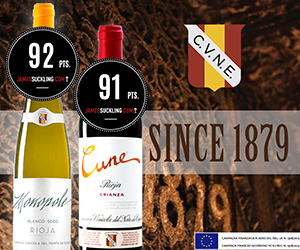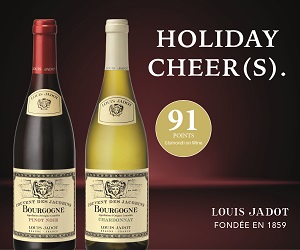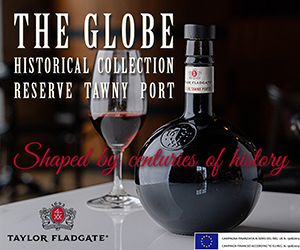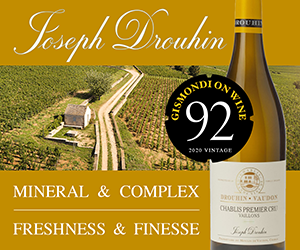The newest of British Columbia's fruit wineries, Forbidden Fruit is the only winery in the Similkameen Valley that makes fruit wines exclusively.
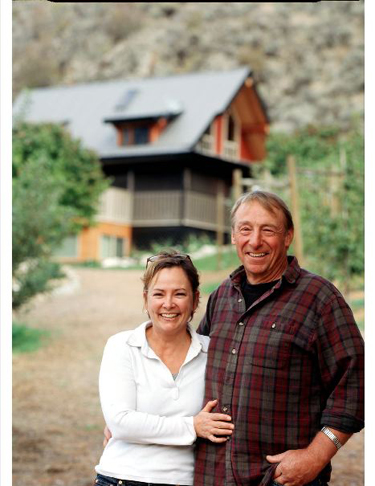
The newest of
It is an outgrowth of the Similkameen's tremendous dedication to organic farming. About 40 per cent of the farms in the valley are organic. This winery is based on one of the first, Ven 'Amour Organic Farms, established in 1977. It is owned and operated by Steve Venables and Kim Brind'Amour, among the most dedicated of the Similkameen's organic producers. Having made their mark as farmers, they are setting out now to make their mark as well in wine.
Venables is a
The property he found was raw land secluded beside the
Only 22 acres is planted to tree fruits. "Everything grew extremely well here," Venables says, explaining one reason for farming organically. Secondly, he and Kim (a former health food store operator) believed the environment would be healthier for them and their three children.
"And we all agree that organic food tastes better," Kim adds.
They have packed about 60 varieties of fruits onto their farm, including 25 apple varieties and 12 peach varieties. Just about the only tree fruit that did not thrive here is nectarine.
The farm has done well because organic fruits command a premium. In recent years, however, those premiums have been squeezed as many more farmers climbed onto the organic bandwagon. With an eye to other sources of cash, Ven'Amour farm added a guest house in 2001, and then a small art gallery.
The Forbidden Fruit winery, which began selling wines during a soft opening in September, is the latest step in adding value from what the property produces. With the increase in the volume of organic fruit production, it has become harder to sell any fruit whose appearance is less than perfect. The flavours and the qualities compare well to number one grade fruit but premiums are paid only for the top grade.
Number two grade fruit, however, is just fine for wine. In fact, it should produce more revenue as wine than it gets in the fresh market. When Venables and Brind'Amour figured that it, opening a winery was a "no brainer ... There is so little fruit wine out there."
To make the wines, they recruited Dominic Rivard, one of
Rivard fits Forbidden Fruit into his punishing schedule because there is a flexibility in making fruit wines that is not available to a grape winery. Generally, fruit wineries freeze their raw material, thawing it to break down the fruits before fermenting them. All that Venables and Brind'Amour need do is get their fruits from the freezer two or three times a year when Rivard arrives to make wine.
"Dominic is training us to make the wines," Kim adds.
Aside from the winery's web site (www.forbiddenfruitwines.com), the wines are still hard to find, if only because the first release only totalled 560 cases of wine, mostly in half bottles. Production currently is being doubled, to be available next year in Forbidden Fruit's wine shop when Venables and Brind'Amour plan a formal "grand" opening.
The first release consisted of a dry apple wine and four sweet fruit wines. The longer-term objective is to increase the volumes of dry fruit wines that are more readily paired with main courses. Among the wines to be released in the spring are two dry pear wines (one made with Asian pears, one with the more familiar European pears).
With their first wines, Venables and Brind'Amour have demonstrated considerable marketing flair. Most of the wines are packaged in elegant Icewine-style bottles, with creative names and back labels text ranging from interesting to florid.
An example is the oak-aged cherry port, released as Cerise d'Eve. The back label reads, in part: "Known throughout the ages as the fruit of Love, flushed red with pleasure or with shame, Cerise d'Eve is a shimmering red port wine with huge aromas or ripe cherries."
These are the wines:
Adam's Apple ($17.90): A dry apple wine with 11% alcohol, this has bright, fresh aromas and flavours of the fruit. A well-made easy-drinking quaffer, it should appeal to cider lovers. It is refreshing before a meal and pairs well with many dishes.
Impearfection ($21.95 for 375 ml): Coyly-labelled Impearfection is a play on the ingredient, Asian pears, a fruit once limited to the Chinese Imperial court. This is an aperitif/dessert wine. It begins with exotic aromas of rose petals, ginger and spice, leading to layered honeyed
Cerise d'Eve ($32.95 for 375 ml): A cherry port with 17% alcohol, this wine has a brilliant jewel-like hue. The flavours are intense, with notes of cinnamon and peppermint and fruit. Sweet but well-balanced.
Crushed Innocence ($19.95 for 375 ml): Made from white peaches, this light, refreshing wine reaches out with a fruity aroma that jumps from the glass. The flavours are delicate, yet intensely focused and virginally pure. The wine has 10.5% alcohol and is slightly off-dry.
Pomme Desiree $24.95 for 375 ml): Blended with six apple varieties, this ice cider is a stunning tour de force with crisp, clean apple flavours and a luscious juicy texture. The colour is light golden.The wine has 11% alcohol and a sweet but well-balanced finished that persists.
John Schreiner is author of The Wineries of British Columbia.
 quicksearch
quicksearch


